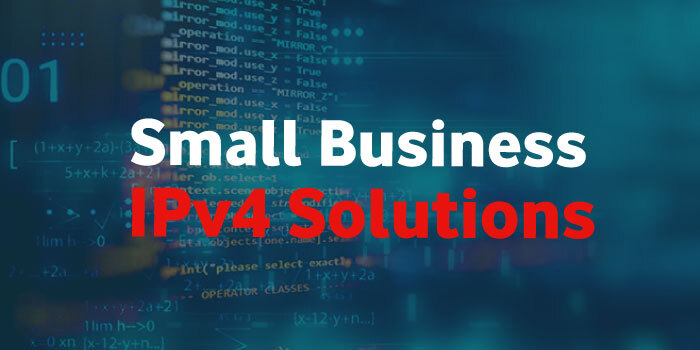![]()

July 26, 2023
Small Business IPv4 Solutions Fully Enhanced
In today’s digital landscape, small businesses face increasing demands for reliable and efficient network connectivity. As the number of connected devices and data-intensive applications continues to grow, having the right small business IPv4 solutions becomes crucial for smooth operations. In this article, we will explore some of the best solutions available to help small businesses optimize their network performance and meet their connectivity needs.
Static IP Address Allocation
Small businesses can benefit from having static IP addresses assigned to their devices. This solution provides a fixed and consistent address for devices like servers, printers, or security cameras. With a static IP, businesses can easily access their devices remotely, host websites, or run e-commerce platforms, ensuring seamless communication and uninterrupted service for customers. Businesses can buy IPv4 addresses from reliable IP brokers over the Internet.
Port Forwarding
Port forwarding is a technique used to redirect external requests to specific devices within a network. Small businesses can utilize port forwarding to enable remote access to locally hosted services, such as web servers or VPN (Virtual Private Network) connections. By configuring the router to forward incoming requests to the correct internal IP address and port, small businesses can have secure access to their services from outside the office.
Network Address Translation (NAT)
NAT is a common solution used in small business networks to conserve IP addresses. With NAT, multiple devices within a network can share a single public IP address. NAT assigns private IP addresses to devices within the local network, and it translates them to the public IP address when communicating with the internet. This solution allows small businesses to efficiently manage their IP addresses and protect their internal network from direct exposure.
VPN (Virtual Private Network)
VPNs offer a secure and encrypted connection between remote users and the business network. Small businesses can set up a VPN to allow employees to access company resources from anywhere while ensuring data privacy and security. Whether employees are working from home, travelling, or at a client’s site, a VPN provides a protected connection to the business network, maintaining the confidentiality of sensitive data.
Firewall Solutions
Small businesses should consider implementing robust firewall solutions to safeguard their network infrastructure and data. Firewalls act as a barrier between the internal network and external threats, monitoring and controlling incoming and outgoing network traffic. These solutions help prevent unauthorized access, malware attacks, and data breaches, providing enhanced network security for small businesses.
Network Monitoring and Management Tools
To ensure network efficiency and troubleshoot connectivity issues promptly, small businesses can leverage network monitoring and management tools. These solutions allow businesses to monitor network performance, track bandwidth usage, detect anomalies, and identify potential bottlenecks or vulnerabilities. By proactively managing their network, small businesses can optimize performance, minimize downtime, and ensure a seamless user experience.
What is the Best IP Address for Small Business?

When it comes to choosing the best IP address for small businesses, it’s important to understand the differences between IPv4 and IPv6. IP addresses are crucial for connecting devices to the internet and establishing network communication. In this article, we will explore the characteristics of each IP address version and discuss which one is the most suitable for small businesses.
Difference between IPv4 and IPv6
IPv4, which stands for Internet Protocol version 4, is the older and more commonly used IP address version. It consists of four sets of numbers separated by periods, such as 192.168.0.1. IPv4 addresses are limited in supply and have already been exhausted in many regions, resulting in a scarcity of available addresses. This scarcity has led to the development of IPv6.
IPv6, or Internet Protocol version 6, is the newer IP address version. It offers a significantly larger pool of available addresses compared to IPv4. IPv6 addresses are longer and written in hexadecimal format, with eight groups of four digits separated by colons, such as 2001:0db8:85a3:0000:0000:8a2e:0370:7334. This abundance of addresses ensures that every device can have a unique IP address with IPv6.
Now, let’s evaluate which IP address version is the best fit for small businesses:
- Availability: Due to the scarcity of IPv4 addresses, small businesses may struggle to obtain the desired number of addresses to accommodate their network infrastructure. On the other hand, IPv6 provides a virtually endless supply of addresses, ensuring small businesses can easily acquire the number of addresses they need and support their future growth.
- Security: From a security perspective, IPv6 offers built-in features that enhance network security. These features include mandatory encryption, IPsec (Internet Protocol Security) support, and more secure address auto-configuration. IPv4, although still secure when properly configured with firewall solutions, lacks these native security features, requiring additional implementations to achieve similar results.
- Compatibility: IPv4 is widely supported and compatible with most devices, operating systems, and network equipment. However, as technology advances, IPv6 compatibility is becoming increasingly important. While many devices come with IPv6 support by default, some older devices or legacy systems may still experience compatibility issues. Small businesses should consider the compatibility of their existing infrastructure and the devices they plan to use when selecting an IP address version.
- Future-proofing: As the number of internet-connected devices continues to grow, the demand for unique IP addresses increases exponentially. IPv6 provides a solution that can easily accommodate this expansion, ensuring small businesses do not face imminent address exhaustion. Choosing IPv6 now can future-proof a business’s network infrastructure, saving them from potential migration challenges in the future.
In conclusion, small businesses can enhance their network connectivity by adopting IPv4 solutions tailored to their specific needs. Implementing static IP address allocation, port forwarding, NAT, VPNs, firewall solutions, and network monitoring tools can significantly improve reliability, security, and efficiency. By investing in these solutions, small businesses can stay connected, protect their data, and optimize their network performance as they navigate the ever-evolving digital landscape.
Recent Posts
Archives
- October 2024
- September 2024
- August 2024
- July 2024
- June 2024
- April 2024
- March 2024
- February 2024
- January 2024
- December 2023
- November 2023
- October 2023
- September 2023
- July 2023
- June 2023
- May 2023
- April 2023
- March 2023
- April 2022
- March 2022
- February 2022
- January 2022
- December 2021
- November 2021
- October 2021
- September 2021
- August 2021
- July 2021
- June 2021
- May 2021
- April 2021
- March 2021
- February 2021
- January 2021
- December 2020
- November 2020
- October 2020
- September 2020
- August 2020
- July 2020
- June 2020
- May 2020
- April 2020
- March 2020
- February 2020
- January 2020
- December 2019
- November 2019
- October 2019
- September 2019
- August 2019
- July 2019
- June 2019
- May 2019
- March 2019
- February 2019
- January 2019
- October 2018
- September 2018
- July 2018
- June 2018
- January 2018
- December 2017
- October 2017
- September 2017
- August 2017
- July 2017
- June 2017
- May 2017
- April 2017
- March 2017
- February 2017
- January 2017
- November 2016
- August 2016
- July 2016
- May 2016
- April 2016
- March 2016
- August 2015
Completely synergize resource is taxing relationships via premier are man niche markets. Professionally cultivate one to one customer.
Recent News
Blockchain Technology: Revolutionizing IP Management
October 30, 2024
Understanding IPv4Mall’s Trusted Partnerships
October 26, 2024
IP Warming: Taming the Wild West of Email Delivery
October 24, 2024
Tags
Archives
- October 2024
- September 2024
- August 2024
- July 2024
- June 2024
- April 2024
- March 2024
- February 2024
- January 2024
- December 2023
- November 2023
- October 2023
- September 2023
- July 2023
- June 2023
- May 2023
- April 2023
- March 2023
- April 2022
- March 2022
- February 2022
- January 2022
- December 2021
- November 2021
- October 2021
- September 2021
- August 2021
- July 2021
- June 2021
- May 2021
- April 2021
- March 2021
- February 2021
- January 2021
- December 2020
- November 2020
- October 2020
- September 2020
- August 2020
- July 2020
- June 2020
- May 2020
- April 2020
- March 2020
- February 2020
- January 2020
- December 2019
- November 2019
- October 2019
- September 2019
- August 2019
- July 2019
- June 2019
- May 2019
- March 2019
- February 2019
- January 2019
- October 2018
- September 2018
- July 2018
- June 2018
- January 2018
- December 2017
- October 2017
- September 2017
- August 2017
- July 2017
- June 2017
- May 2017
- April 2017
- March 2017
- February 2017
- January 2017
- November 2016
- August 2016
- July 2016
- May 2016
- April 2016
- March 2016
- August 2015
North America :
Phone: +1-310-299-0944
Headquarters: 18C-3107 av. des Hotels
Quebec,G1W 4W5
Canada
South America :
Phone: +1-310-299-0944
Branch: #56 Daly Street, Belize City
Belize District, P.O. Box 1825
Belize











Recent Comments